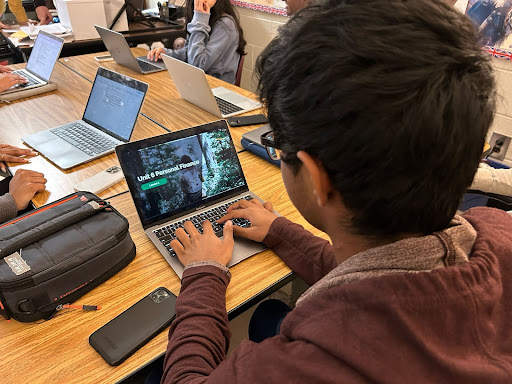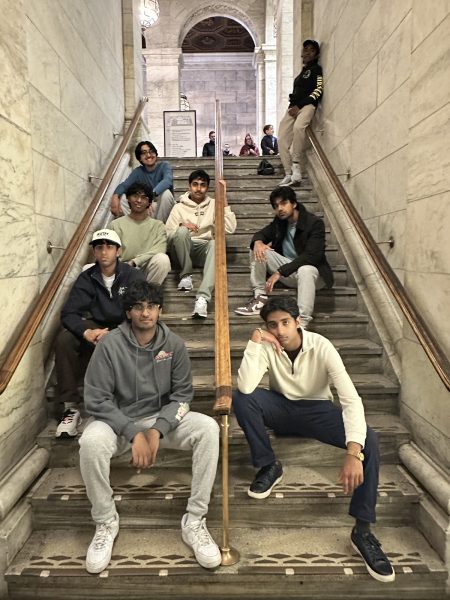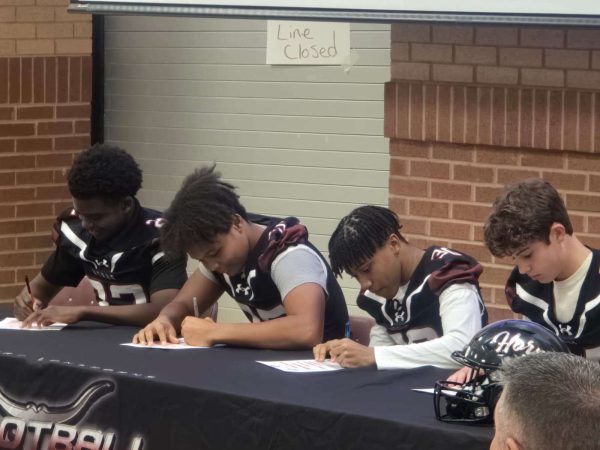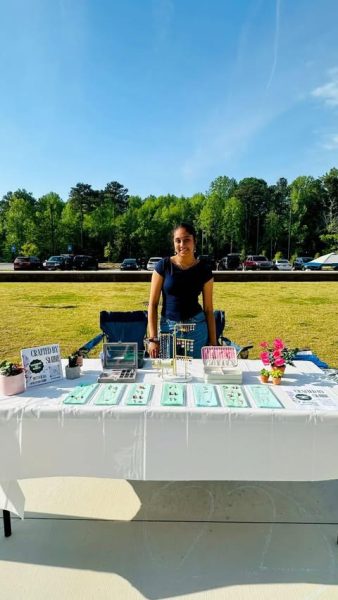Lambert Needs to Learn Personal Finance

Lambert student Joshil Vaddi studies personal finance at school, learning about insurance. Photograph by Chitvan Singh, March 27th, 2023
Many seniors at Lambert are about to experience a turning point in their lives – graduating from high school. This is the time when they finally become adults and leave their households. Alongside this transition comes many new responsibilities, one of which is managing your own finances.
In our modern society, this skill is absolutely essential in order to achieve life goals such as buying a house, starting a family or preparing for retirement. Yet despite its importance, it’s the one skill that many Americans are often not taught. In fact, a 2018 study showed that only a third of Americans were able to answer basic financial literacy questions.
The effects of this trend have already become clear. A 2021 report by the National Financial Capability Study found that over half of Americans felt anxious about their finances and that over two-thirds felt unsatisfied with their current financial situation. While possible explanations for this trend include a decrease in wages and a pandemic-era recession, another big factor is financial literacy. Not knowing how to properly budget or invest can leave many in confusion when it comes to finances. Never being taught these critical skills is a large barrier to entry when it comes to fiscal sustainability.
It’s clear that increased school education surrounding financial literacy is essential in order to provide Americans with the tools they need to survive. At Lambert, while there is a graduation requirement of some financial education, for most students, this comes as part of their economics courses, which don’t have financial literacy as their main focus and instead only feature a small unit on financial literacy.
Try as they might, it’s impossible to teach everything there is to know about financial management in just a week or two. For students to actually be fiscally proficient, we need a dedicated course for this very purpose.
It’s important to note that at Lambert there do exist courses such as Accounting as well as Banking, Investment & Insurance which teach these essential skills. However, these courses aren’t mandatory and are only found in the higher levels on the business pathway at Lambert.
Though, as a result of their exclusivity, these classes provide a good basis for financial knowledge that goes beyond the personal finance units a student needs to graduate. Essential skills such as managing insurance and investing your money are taught in these courses, leading to a greater understanding for students – one that they remember.
“So many Americans have problems with their finances, and lack of education concerning personal finance causes a lot of Americans to go into crippling debt and dig a hole so far that they can’t come out of it,” Lambert junior Joshil Vaddi, a student in the business pathway, said. “Knowing about personal finance lets you avoid many of these problems, and can help you stay on top of bills, effectively allocate your money, and build up savings for retirement, college funds, unexpected expenses, and for the payoff of loans or credit.”
As Vaddi describes, there’s quite a few things to be learned from a personal finance course – things that impact pretty much every aspect of adult life. Be it managing your taxes or investing, such important information shouldn’t be exclusive to those in the business pathway. Since there’s already a format for such financial courses, it wouldn’t be particularly difficult for Forsyth County to implement a year-long, mandated financial education course for all high schoolers.
With the rise of financial illiteracy, it’s even more important that our school system does its due diligence in ensuring that students are prepared for the real world. Lambert already has a great start by having financial literacy as a graduation requirement, something over half of states don’t have. This aspect of our education is critical, and I strongly believe that this school can do even more. As the saying goes, money makes the world go around. Thus, it’s an essential part of sparking change in the world. Having a generation who understands even basic financial concepts makes them ever more capable of achieving their goals and living a fulfilling life.
Your donation will help support The Lambert Post, Lambert High Schools student-run newspaper! Your contribution will allow us to purchase equipment and cover website hosting costs.












